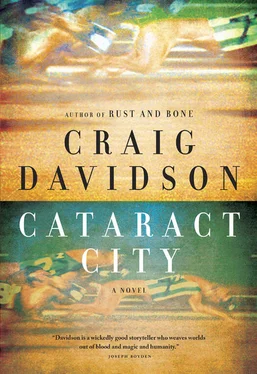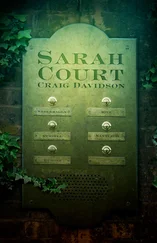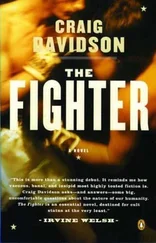At night he’d switch the soda for Jolt Cola and become beet-faced and weird. We’d stoke big bonfires, driftwood piled in a rickety heap. Owe doused it in kerosene and lit it, shrieking giddily as the fire ate the bleached sticks.
“Remember?” he said to me one night over the flames, his grin a grim rictus. “In the woods? What we’d have done for a fire like this, huh? Hah!”
He acted as if the last few months of his life, everything post-injury, had never happened. He’d brought a bunch of stuff to the trailer with the intent of giving it away: old jerseys, a laminated four-leaf clover, photos he’d snapped during a camping trip in Banff. “I brought this just for you,” he’d say, pressing something into someone’s hands as if the item had specific meaning to its recipient. But I’d watched him try to give the same things to different people.
His buddies from Ridley showed up, guys with names like Thad and Chad and Bradley-not-Brad, girls with names like Pris and Elle whose tennis skirts danced around their thighs. They drove ragtop Beemers, drank Bartles & Jaymes wine coolers and smoked skunky dope. They came, stayed awhile, filled themselves with the unshakable sense that something was deeply the matter with Owe and left. Owe waved from the beach as they drove off, his hand floating above his head, loose as a balloon on a string.
I kept visiting, though, and Ed was there the whole time. She’d been rehired at the Bisk; she used up all her vacation days to be with him.
But Owe wasn’t there in the truest sense. During the day, his eyes would dart along the sand as if he were tracking a sand crab or a shred of litter. But there was no crab, no litter. At night, he’d flinch as if sparks from the fire were popping in front of his face. I’d stay up in the trailer, listening for his voice. Sometimes I’d hear him: a low acid chuckle rising from the beachhead, lapping over and over with the waves.
Ed tried to rouse him. But it was like trying to transport sand with a sieve. When he was happy it was with a manic-sick happiness; his smile sat on his face like a Halloween mask, twitchy-dark things beneath. When he was sad, the melancholy seemed bottomless and incurable. He was never just Owe, the Owe we knew.
At night Ed stumbled into the trailer and fell asleep alone in the woodsmoke-smelling darkness. I wanted to go to her, comfort her in whatever way I could. But I didn’t. Couldn’t .
One night we sat together on the beach. Owe had been drinking all day and was zonked in the trailer.
“He’ll get back to himself,” Ed said, as if she had the power to make it happen.
I said, “He won’t stay this way forever.”
“You’re solid, Dunk.” She peered at me in the glowing remains of the bonfire. “You know? You’re not too high, not too low. You’re solid … safe.”
“I don’t know how safe I am.”
“Oh, very safe. Trust me.”
“Well, I don’t plan on being here my whole life.”
Her eyebrows took on a troubled slant. “What’s so wrong with right here?”
I couldn’t frame an answer. There was the moon casting its glow on the water, breeze curling off the shore. There were Edwina’s legs stretched out, toes smoothing the warm sand at the fire’s edge.
“Nothing, I guess,” I conceded. “It’s pretty … perfect.”
She laughed. I loved the sound rolling alongside the lake, easing softly into the other night sounds. I thought how I could listen to it for the rest of my life. Dolly trotted over and stretched out between us.
I was just nineteen, but nineteen wasn’t young in Cataract City. I knew that a moment comes when you’ve got to make your best hand and stand pat. I’d always felt Ed and me were the right fit — but did that doom her in some weird way?
I also knew that she might never love me the way she loved Owe. And Owe was my very best friend. He was sick and he needed me.
But I loved Ed, and sometimes love makes you helpless.
I held my hand out. If Edwina hadn’t put her hand in mine I wouldn’t have blamed her one bit. I wouldn’t have chased it any further.
But she did, y’know? She put her hand in mine.
We told Owe in Lions Club Park. He was wearing a pair of grey sweats with a Dijon stain on the left knee. His cheeks were furred with stubble. He watched us approach from the bleachers with his head cocked, as if he’d read our intentions on the breeze.
“Hail, hail, the gang’s all here.”
A T-ball game was in progress, and our walk towards Owe was punctuated by the metallic tink of an aluminum bat striking a stationary ball. The stands were packed with parents who seemed a little too keen, as if they expected their five-year-old to launch a moonshot over the outfield fence. The day was warm and sunny, and kids were buying Ghost-cicles and Rocket Pops from a Dickie Dee man.
When Ed told him the news, Owe’s face set in a leering grin.
“You figured you’d tell me out in public so I wouldn’t make a scene?” he seethed. “I don’t give a fuck what any of these assholes hear!”
Ed and I stood there; in Owe’s eyes we must’ve been Hester Prynne and Benedict Arnold. He jerked himself up, ignoring the hissing scolds of the parents — the game had come to a standstill, kids staring gape-jawed at the sloppily dressed guy who’d been the city’s saviour scant months ago — as he gimped down the stairs, giving it the full Quasimodo treatment so we’d feel like even bigger heels.
“You’re a bum, Dutch!” an enormous woman catcalled, her butt spreading across the risers like dough. “You got no heart. You never did!”
Others in the crowd voiced their approval. These were the same people who’d cheered Owe wildly not long ago. They’d loved him and now they hated him — and they loved hating him.
Ed went after Owe. He shrugged her off viciously, knocking her down. She sat on the clipped grass watching him hump away.
“Jesus,” she said. “ Not how I pictured it happening.”
That was all we heard of Owen until a letter arrived.
Dear skunks:
Enjoy each other. Trash attracts trash, right? I leave you to your trailer-park lives. I hope you pop out a brood of revolting, zero-IQ blobs, as nature surely intended. You have my blessings!
Yours most sincerely ,
Owen Jeremy Stuckey
Now that pissed me off. When I hammered on the door of Owe’s house late the next afternoon, Mr. Stuckey answered, same as he’d done years ago when I showed up with two baby greys in my backpack.
“Come in, Dunk.”
I went inside with Dolly. A half-hour later Owe dragged his ass out of the basement. Eyes bloodshot, jowls furred with a scraggly beard, but skin so milky I figured he hadn’t seen daylight for a week. Frag padded obediently at his side.
“What do you want, man?” He sounded exhausted.
“Let’s go walk the mutts.”
He stared blankly. “Okay.”
It took him nearly an hour to get dressed, and even then the attempt was half-assed. One white sock, one black. It’d do.
Thanks, Duncan , Mr. Stuckey mouthed as we left.
Owe walked with a cane. He’d chosen it himself — a giant gnarled stick like a wizard’s staff with a grey rubber stopper on the end. It accentuated his disability, which I’m sure was his aim.
Dolly and Frag nipped playfully at each other; they hadn’t roughhoused together in a long time. Owe shuffled along, cane going phunk on the sidewalk. He stank. I told him so.
“Ran out of deodorant, man.”
“You can never technically run out of deodorant so long as you’re committed to the idea of, y’know, buying more of it.”
Owe gave me a wry smile. “That was a very scholarly bit of ball-busting.”
Читать дальше












